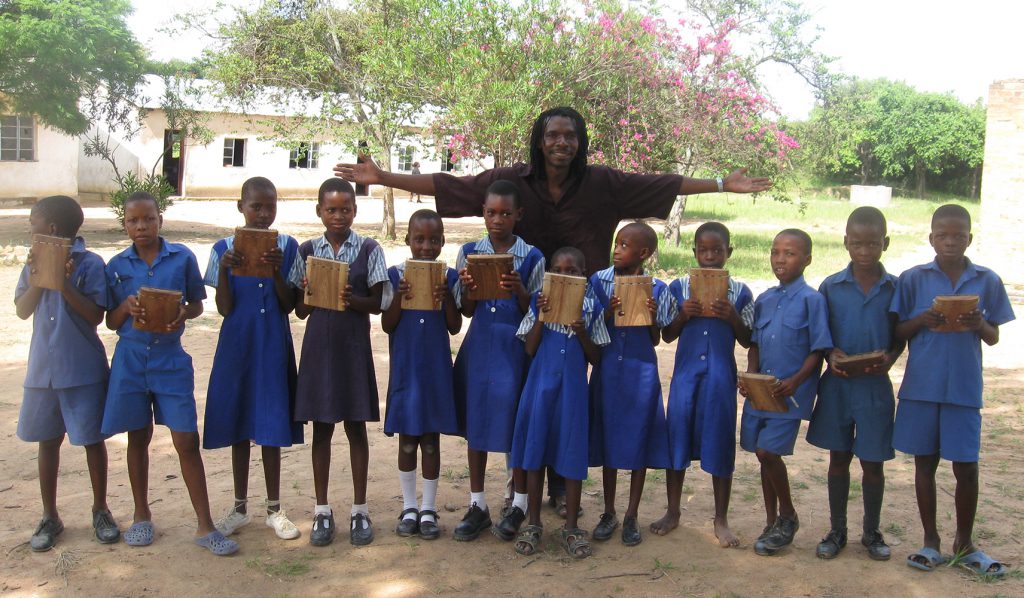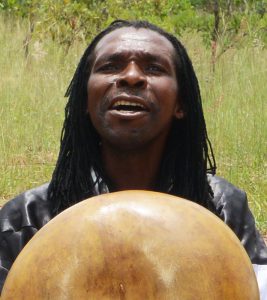Introduction
‘Sinyoro’ Caution Shonhai plays the ancient Shona mbira in traditional Zimbabwean ceremonies, and is the medium of his great-great-great-great-grandfather’s spirit, who was an outstanding mbira player. The influence of this ancestor can be clearly heard in the Shonhai family’s unusual mbira style.
Sinyoro respects and follows the Shona traditions that his family has followed, generation after generation. He is also fluent in English, and enjoys sharing his music (mbira, singing, drumming, hosho), dance, and Shona traditional culture and religion with foreigners, as well as Zimbabweans. Shonhai is a n’anga, a Shona traditional healer and herbalist, and spirit medium.
Caution Shonhai visited the US for the first time in 2010, and toured the U.S. more widely in 2011 with Erica Azim, to enthusiastic response. In 2013, his group Tichakunda Mbira performed in Konya, Turkey at the Konya International Mystic Music Festival.
Recordings Available From MBIRA
Listen to samples of Caution Shonhai’s many albums.
Videos
Caution Shonhai and Erica Azim play Nhai Mambo in 2010
Biography
(based on a 2009 interview,and written by Denver Banda; edited and updated by Erica Azim)
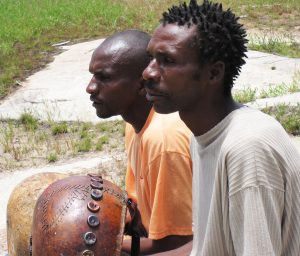
Family Musical History
Nyamweda is a rural area of Zimbabwe renowned for its mbira players and makers, including the late John Kunaka and Mondrek and Erick Muchena. In the Shonhai family, the mbira tradition has been passed from generation to generation. Caution Shonhai’s great-great-great-great-grandfather was a famed mbira player called Nzuwa who played both njari and mbira dzavadzimu.
Of those in his generation, Caution’s older brother Clyde was the first to play mbira. Their father loved mbira music and was well known for singing – doing the mbira variations to songs vocally without actually playing the instrument. This thrilled Caution as a child, and he also joined in the singing.
The elders in the Shonhai family did not want children close to the banya (ceremonial hut). However, since the banya was where traditional rituals occurred and mbira was played, Caution refused to leave the vicinity of the banya…he was so drawn to the music.
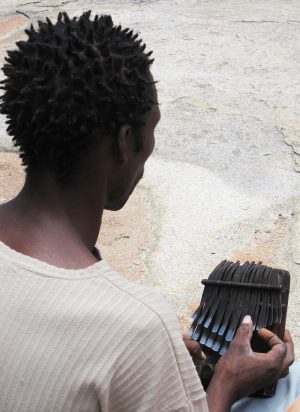
Learning Mbira
By seeing his father correct local musician Langton Bapiro, Caution began to understand the depth and complexity of mbira music. Caution employed his father’s critical ear and singing of mbira melodies as a guideline for learning the mbira. At the age of eleven, the first songs that Caution learned from Langton Bapiro were the kushaura parts for Nhema musasa and Kariga mombe.
“I could clearly hear the tune in my head but I couldn’t place it onto the instrument. Langton would then tell me to strike the keys one after the other until I got it. It was hard at first but with the help that I got from my father’s comments and corrections, Clyde and I managed to improve our playing and repertoire rapidly.”
Sinyoro learned the pieces Dande and Muzoriwa/Chigamba through vocal instructions from their father, who always listened closely to them when his sons played mbira. Having learned the kushaura parts to songs, their father would teach them the kutsinhira parts using the same method. When it came to combining the interlocking patterns, Caution took his father’s singing cue and followed his vocal mbira imitations to place parts within the piece’s structure. Part of the reason why Caution mainly learned from his father’s singing was that his teacher Langton Bapiro moved away from Nyamweda during Zimbabwe’s liberation war.
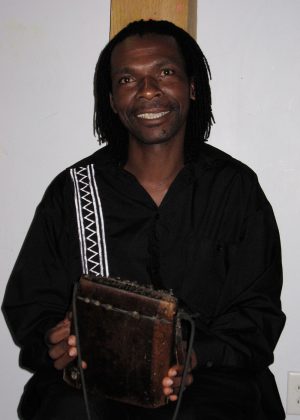
“Usually we would get it after a few cycles and, with the experience of playing with Bapiro, we learned parts after 20 minutes. When father saw that we were good enough, he would then play hosho for us.”
Caution’s parents welcomed having two sons playing mbira in the family. When the boys started to play in important ceremonies, the parents asked their eldest son (the main breadwinner of the family) to purchase four instruments for the two to use. Before that, they borrowed instruments from Bapiro, who was sometimes away playing at other ceremonies. The four instruments were bought from Steady Shokoni in 1986. The mbiras had two different tunings for the main seasons. Two of the new instruments were officially earmarked for use for spiritual and ancestral purposes in a special ceremony to mark them as the bridge between world of the living and that of the ancestors. When it came to the season of kurova guva ceremonies (held to bring a person who has died back to the family/community as a spirit), the Shonhai brothers received many invitations because of their unique style.
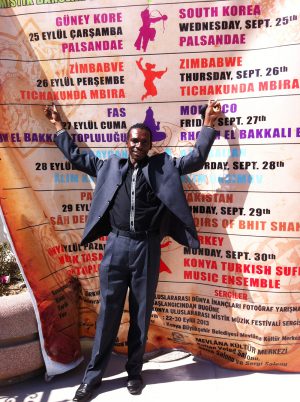
Sinyoro says mbira players Lazarus Njenda, Murawo Tembedza and Langton Bapiro were his main influences.
“We took full advantage of having these great musicians among us and learned the best from them at all times, taking all constructive criticism as a learning process.”
In addition, many songs and styles Shonhai plays were taught to him in dreams by the ancestral spirit he is the medium of, or taught to family members by the spirit via Caution.
Caution Shonhai loves all mbira songs that he plays, but he has favorites… especially when he plays with someone who understands and complements his style. He most enjoys playing mbira with his son Lasson. Bangidza, Dande and Nhema musasa are the pieces he was most excited about when interviewed in 2009.
Problems of a Mbira Player
Shonhai reflects on the problems that he has faced over the years in relation to mbira music being disrespected and misunderstood. There have been differences with some neighbors and family members who saw themselves as advanced and worldly. Caution remembers some saying to his parents:
“This mbira business that your kids are involved in will make them get the mashave (spirits) of vagrants. If you see them hold that instrument at that age, they will die destitute and you will be laughing stock of the community.”
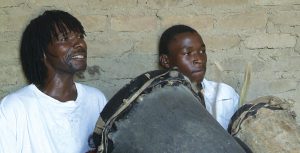
Others in the family were envious and jealous of the talents of the young Shonhai boys:
“How come that these spirits come and work through these little people? They should not be part of our ceremonies because their age is not yet ripe to be accepted in ceremonies and ceremonial huts, let alone play mbira in them.”
Shonhai’s resolve to keep playing was reinforced by his parents, who encouraged the boys to keep practicing and playing, and to ignore those who saw the music as backward and unclean. Over the years, perspectives have changed, but the part of his community that was critical in the past is even more vocal than ever, mainly due to their variety of Apostolic Christian beliefs.
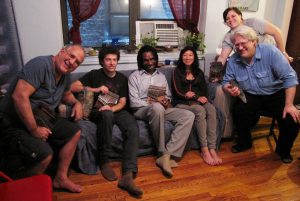
According to Shonhai, there is a distinction between different churches in their approach towards mbira and traditional customs. There are churches that praise mbira and traditional ways, and others that see the instrument and the culture as heathen and unacceptable in the kingdom of God. Sinyoro shares his opinion by lamenting that:
“My perspective as one who loves and plays mbira, I think it’s OK for me to play as long as I know that my playing and veneration of the spirits does not in any way harm or get in the way of other people’s beliefs. I feel content playing for the spirits and their mediums, because it is through playing for them that I will also be playing for God.”
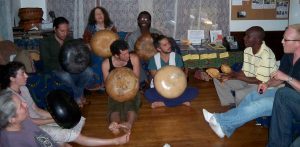
Mbira Tunings
The Shonhai family uses nyamaropa tuning, and their style is local to the Nyamweda area. On visits to Harare, Sinyoro met mbira players from other parts of the country and learned new material. He recalls meeting other mbira players in Harare who had strange tunings and differently constructed instruments. He enjoyed playing these instruments as a pastime because they had a different voice and structure than what he was used to. However, he made it clear that he only played these instruments for fun, and not as something that he could do in ceremonies or be serious about.
“When it comes to serious ceremonial and ritual work, my heart does not feel for or accept anything else than the traditional way of playing and the traditional tunings that we grew up using. When I play using the traditional tuning I feel the soul of the music.”
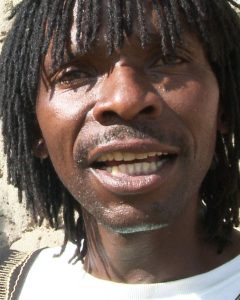
Proper Behavior of a Mbira Player
Because mbira music is sacred, mbira players have specific behavior that they follow when they are invited to be part of a ceremony, whether a kurova guva (ceremony to bring a person who has died back to the family/community as a spirit), mukwerera (rain-making ceremony) or bira (usual ceremony for the ancestors). Shonhai says he learned from his father that one has to ask for guidance from the spirits of the clan a few days before the ceremony. One cannot ask for guidance on the day he is departing for a ceremony because the spirits also have to prepare you for the ceremony, so doing it on short notice is not acceptable. When asking for guidance in advance, he will do the prayers on the day he departs and will be guided all the way to and from the ceremony. He maintains that he has been following this strict code of conduct ever since he started playing mbira, and has refused to play in ceremonies when asked to go without advance notice.
“I remember a close friend who came to get me for a ceremony and I politely explained to him that I could not go with him because I didn’t want to disrespect my ancestors, since they are the ones who gave me the strength to play. I may help you, but I will be the one with a case to answer for not having told my spirits and ancestors. It is the same as what happened today when coming here – Renold and I have been asking for guidance from the ancestors for the past few days so that our journey here (Harare) will be blessed.”
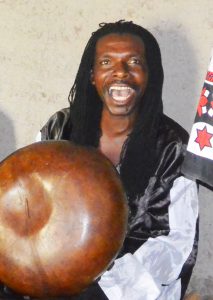
Mbira Singing
Shonhai says his singing is inspired by what is going on in the mbira playing. The melodies and interlocking patterns on the mbira are a beacon that he follows when he sings. As he sings, some of the vocals he incorporates just come, and he may not remember them after he finishes playing. However, Sinyoro explains that certain songs have a set way of singing from long ago, and he cannot change that, since changing it may affect how the song is accepted by the spirits that he is playing for. An example he gave was the way he sang on the piece Dangurangu (MBIRA CD/Download 3466). Shonhai made it clear that when he sings with mbira, he does not arrange or structure his singing, as is done in other forms of music.
“It all comes naturally and I do not force my voice to do things that it cannot do because every song has its own style and life…I might weave in and out of the melodies but everything I do is governed by the mbira. On some songs, I find it easy to do huro (high-pitched lead singing), on others I will be fine doing mahon’era (low-pitched singing of bass lines) and kudeketera (Shona sung poetry) and on other renditions I will be comfortable doing all three styles or none.”
At the Bira
Shonhai states that when he and his mbira partners play at ceremonies, they are servants of the spirits, and will follow what that family wants them to play. Once they discover the pieces and variations that this family’s spirits enjoy, they play these all night. “We know that amongst the spirits there are different preferences and during the course of the night we try by all means to play what the spirits request or enjoy the most.” Shonhai also made it clear that some of the renditions are dictated by the type of ceremony, and the type of spirits, that they are playing for.
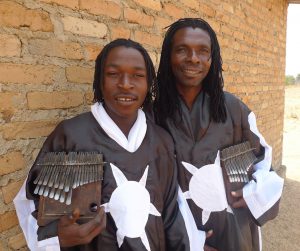
Mbira Partners
For many years, Caution played mbira with older brother Clyde. At first, younger brother Renold joined them mainly as a hosho (rattles) player. When a close friend who was their regular hosho player died in 1993, Renold became a permanent member of the group. Gradually Renold became one of the mbira players after the death of older brother Clyde. Now that Renold lives and works in South Africa, Caution’s mbira partner is his talented son, Lasson, with whom he has formed the Tichakunda Mbira Group.
The Old and the New
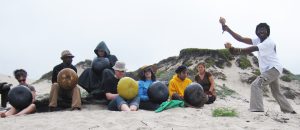
Shonhai had this to say about the phenomenon of new styles of mbira playing:
“Eh, ‘what is eaten by others should not be disrespected’ because I do have some weird mbira just for entertainment. But, when it comes to the mutsa (soul, root) of mbira I prefer the old ways of playing and arrangement. For those who mix the instrument with guitars and other instruments, I see it as shavo or kushava (ways of sustaining oneself) that do not have hwaro (history and depth). By saying so, I do not mean to disrespect what it is that they are doing, but there has to be hwaro in the music. The mutsa of mbira is not found when you mix the instrument with western ones like guitars, or when you have magada (different mbira tunings making an orchestra) like other mbira groups that are coming onto the scene. I am not saying…that their music is not entertaining but the mix will not be able to bring the ancestral spirits since the mutsa won’t be there. In some respects it may be a difference in the regions where we come from as mbira players. Where they come from, it may be acceptable to play in such a manner.”
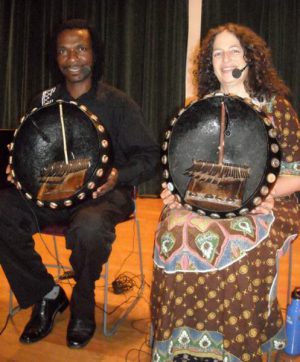
Sinyoro says the most important thing about the mbira is that the instrument is a munyai (intermediary) between the world of vadzimu (ancestors) and that of the living. “I am content that by working for the vadzimu through playing mbira, they always provide for those who play their music.” Sometimes, while possessed by his ancestor’s spirit, Shonhai plays complex variations on the mbira that he did not know, and would not know after playing. His mbira partners will then tell him about these variations and teach them to him later. For one to be a success in mbira playing, Shonhai says he or she has to follow the muko and mutemo (codes and ethics) that the ancestors and the spirits prescribe for those who play their music.
Personal History
On 24 February 1967, Caution Tichakunda (“we shall overcome”) Shonhai of the Moyo Sinyoro totem was born in Kadoma, Zimbabwe, to parents Tinaapi Cuthbert Nyawo (Moyo Sinyoro totem), a textile factory clerk, and Bernadette Mavhunga (Mhofu Mutenhesanwa totem). He is the third in a family of seven children.
Caution attended Chimatira Primary School in the Nyamweda region of rural Mhondoro Communal Area, but could not stay in school because his father had lost his job, and could not pay school fees. When Caution returned to school two years later, he skipped a grade at school – thanks to the efforts of his father, who valued education so highly that he home-schooled his children. Shonhai’s education was disrupted again by Zimbabwe’s liberation war at its peak between 1978 and 1980. The coming of independence saw him return to school once more.
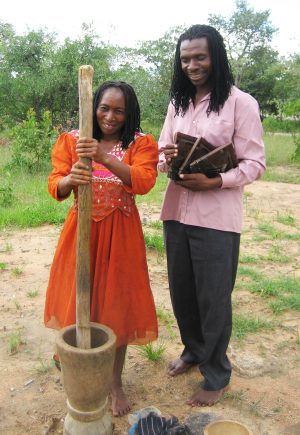
Caution attended Mutukwa High School in his rural area. After he finished school in 1990, he worked for two companies as a clerk and then a food packer. He left work as a result of illnesses related to his spirits. His eldest brother, the head of the family after the death of their father in 1987, ensured that all the appropriate rituals and rites were conducted to appease and venerate Caution’s shave rembira (spirit causing one to be an mbira player) and mudzimu wedzinza (family ancestor) spirits. When Caution recovered, he went to work as a mechanic-in-training. However, because Caution’s spirits preferred that he live in a rural area, he left work and moved back to Nyamweda in 1995 to begin farming full-time. Caution, with the help of his wife, is a successful market gardener.
Caution is married to Susan Nyakusendwa of the Mbizi/Samaita clan and they have four children. The oldest is Lasson, followed by Nancy, Prince and Milton. Caution taught Lasson how to play mbira, after hearing him trying out some of the songs the family usually played. Caution says that most male members of his extended family play mbira. It is expected that all males in the family will learn mbira from the older players. Caution and Lasson have also taught Nancy to play mbira.
Since 1995, Caution has been a full-time farmer, mbira player, and n’anga (traditional healer). He says:
“There is indeed prosperity in playing mbira in that, for me, it is more of a prayer from which I get material, emotional and spiritual returns. I see the playing as more rewarding even where I play for free and the spirits come, that is very crucial for me to achieve when I play.”
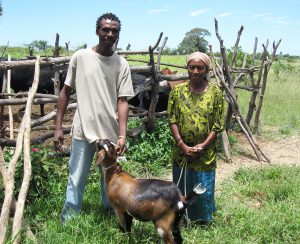
Success with MBIRA
By 2009, the financial returns from his MBIRA recordings enabled Shonhai to purchase a number of cattle and goats, and to help his cousin’s son pay the brideprice required to marry in Shona culture.
Sinyoro used his MBIRA earnings from his first US tour in 2010 to build more durable housing at his musha (village), including extra space for his eager foreign guests. He toured the US with Erica Azim in 2011, enabling him to buy a house in Harare which he rents out to cover family expenses, as the extended family continues to live in the village.
Shonhai also teaches mbira as a volunteer at several primary schools in his region, using instruments donated by MBIRA.
